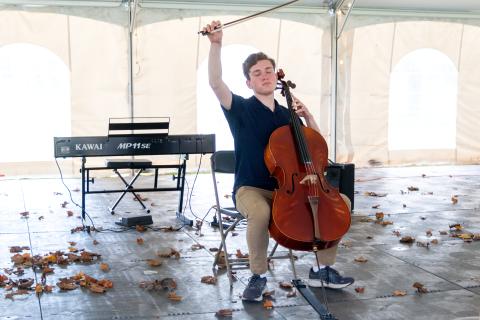Music
Image

Points of Entry

Any 100-level course provides a potential starting point for students new to the study of music. 200-level courses are points of entry for students with some musical experience, as specified in the course descriptions.
Fundamentals of Musical Practice
Preparation for further coursework in performance, creation, and analysis:
Music 111 ("Introduction to Music"), 211 ("Exploring Music") and 213 ("Jazz Theory and Improvisation I") develop fluency in the practical skills for making music, and explore their use in performance, creation, and analysis.
Fundamentals of Scholarship
Preparation for further coursework in ethnographic studies and historical studies:
Students are offered an introduction to Ethnographic Studies through any of the following courses: MUSI 105 ("African Popular Music"), 106 ("Master Musicians of Africa"), 115 ("Writing About Music"), 116 ("Live Music"), 123 ("Sacred Sound"), 128 ("The Blues Muse"), 225 ("Jazz Film"), 232 ("Listening, Hearing, and the Human"), 238 ("Connecticut River Valley Soundscapes")
...and Historical Studies through these courses: MUSI 110 ("The Symphony Orchestra"), 126 ("Hip Hop History"), 220 ("History of Opera"), 221 ("Voices from a Bygone Time"), 222 ("Music & Culture II"), 223 ("The Musical Symptoms of Modernism"), 226 (Jazz History to 1945), 227 ("Jazz History After 1945")
Individual and Ensemble Performance Instruction
Individual instrumental and vocal performance instruction is available (MUSL 151H - 183H).
Performance ensembles are also a good entry point to the major (MUSI 129H - 133H).
